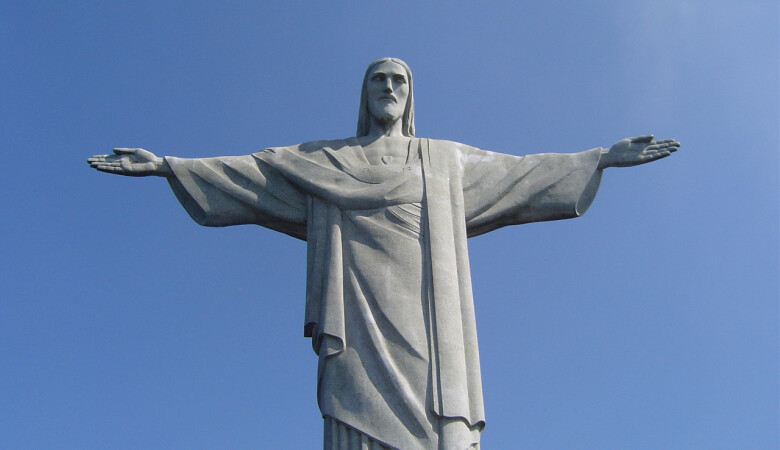Overcoming Spiritual Intimidation, Part 4 (Colossians Sermon 9 of 21)
November 04, 2007 | Andy Davis
Colossians 2:20-23
Holiness, Fullness in Christ
Every day, our invisible God spreads a lavish banquet for our five senses. Every day He does that. The invisible God and the created world lays out a lavish feast. The pleasures of sight. I have seen, driving across this country, unforgettable scenes of beauty. I remember driving across South Dakota and seeing the rolling grasslands there as far as the eye could see, undulating hills covered with grass that was just swaying back and forth in a breeze as though it were an ocean. I'd never seen anything like that before, never anything so large. And continuing on in Montana, they call it "the big sky country," and I saw the big sky there, and a valley as far as the eye could see, and an electrical storm, and lightning flashing from one side and going all the way to the other side of the sky, just like Jesus mentions will be at the time of His second coming, but I saw it there. Unforgettable. And I've also seen a sunset over the Grand Canyon. The purples, and reds, and oranges, and way down below, a silver thread, the Colorado River, glistening in the last light of the day. I've seen that, too. Last week, nothing so grand and dramatic, but I saw my daughter Daphne with a look of joy on her face run across the lawn to greet me home. And that was a feast for my eyes, and probably more special than the others. I've seen these things, and it was God that's laid out that feast for my eyes. And how also for the ears. This morning, we've listened to beautiful music. Hard for me to preach after that last song. You know, I just pull myself together, but the beauty of the music, I've heard that. I've heard Handel's Messiah done skillfully at the Duke Chapel, and just the soaring sounds united with Scripture verses pointing to Christ and how beautiful that was. I've heard what I considered to be a three-dimensional sound. I remember, I used to go camping with my father, Tuckerman's Ravine up in Mount Washington, it's a deep bowl carved by some glacier some time ago. And this wind would blow across, it was like 1:00 in the morning, and it sounded, like I said, a three-dimensional sound, a deep blowing of the wind through that bowl. It was a feast for my ears, and God laid it out.
Now how about the pleasures of taste? A couple of weeks ago, we were talking about honey and how God in Proverbs commands that we should eat honey because it's good, it tastes good. And it was God that made it taste good. And I'm not going to go on much about food right now because it will hinder the preaching. But God lays out feasts of flavors. The world is full of them, and He made it that way right from the very beginning, when He didn't just put one fruit tree that they could eat from but a whole array of them in the Garden of Eden, all different kinds of pleasures of taste. And then the pleasures of smell. Or shall we say more delicately, "fragrance." The delicacy, let's say, of spring flowers, or this time of year, when you walk through the woods and there's that musty fall smell, you know? As you hear the crunch of the leaves under your feet in the woods and you can just smell, it's just a fall aroma, and it's beautiful to me. Or the smell of a baby that has been bathed and smells of that gentle fragrance that babies do when they're so clean, and oh, it's a beautiful thing. And how about the sensations of feel? I remember buying a bolt of silk for Christie when I was in Pakistan, and I remember feeling it, it was so shimmery and so smooth. And then, the rougher feeling of leather, or of a tree trunk on one end, or finely polished furniture on the other.
All of these sensations are part of the sensory world that God has put around us, and God made them. All of them. And He made them good, He declared that they were good. We live in a physical world, and He desires to give us pleasure through these senses. And this world proclaims the greatness of the invisible God that made all of those things. And we as Christians are uniquely able to trace those physical sensations back to the God, the invisible God, who made them, and say, "This is what my God is like. This is how great He is, how good He is, how loving, how wise." We are able to do that. Now, according to the Apostle Paul in 1 Timothy 4:1,” it is the doctrine of demons to deny the goodness of the physical world that we live in, the doctrine of demons to deny it.” To treat the physical body with its five senses as though it were intrinsically evil and something we had to get away from in order to be saved. It's a doctrine of demons.
In his classic allegory in the Christian battle for salvation, the holy war, John Bunyan likens the human soul to a city, a walled city, which he calls "Man-soul." And he says, "Man-soul has five gates, five gates by which things can enter: An ear gate, eye gate, mouth gate, nose gate, and feel gate." These are the five senses. Now, Satan has marshalled his wicked attack on our souls through those gates. But it is foolishness for us to brick over the gates, brick them up so that nothing evil can enter in. That is the doctrine of demons, and that is not the approach to healthy living in this physical universe.
But neither is it the approach to tear down the wall entirely so that there is no protection whatsoever and any and everything can come into the soul. But that's not right either because it says in Proverbs 25:28, "Like a city whose walls are broken down is a man who lacks self-control." In other words, if you lack self-control, you're like a city that has no walls at all, anything can get at you. Therefore, in our holy war, what Bunyan calls "our holy war," we are constantly tempted to go to one extreme or the other, either to brick up the five gates through extreme asceticism, or to tear down all the walls through gluttony. By that, I don't just mean eating, but I mean just glutting on sensory life. Martin Luther likened the constant struggle that the people of the world have with sin to a drunken peasant trying to ride on a donkey, and he leans too far one side and falls down on the mud, and remembering that, gets up and leans too far the other side and falls down on the other side. And so we constantly are struggling for balance in the Christian life.
On September 15th of this year, I was reading about a 30-year-old man in China, Guangzhou, China, who died in a cyber café after a three-day gaming binge. He spent over 80 hours playing online computer games and dropped dead at the end of it. Now here is a man that found something that he liked, something he loved, he couldn't control it anymore, it controlled him and it killed him. On the other end of the spectrum, back in 1999, there was an interesting New Age movement led by a former Australian business woman named Ellen Greve. She changed her name to Jasmuheen, and she had a kind of a spiritual cleansing program involving extreme fasting. And a young woman named Verity Linn died from fasting too much. And so you have the other extreme, thinking that she could be purged from all the pollutants of the world, she went to extreme fasting and it killed her. So you almost get a picture of a third rail, a live rail, on either side and there's death either way. Extreme asceticism or extreme indulgence, either way, it can kill you.
So we need some wisdom from God, don't we, on this? In Ecclesiastes 7, a book of wisdom, says this, "Do not be over-righteous, neither be over-wise. Why destroy yourself? Do not be over-wicked and do not be a fool. Why die before your time? It is good to grasp the one and not let go of the other. The man who fears God will avoid all extremes." So there's some wisdom from God. Now, we're not pressing that the details of the word "over-righteous" and all, basically, it's don't go to extremes when it comes to the matters of spiritual discipline on the one side or indulgence of the good things of life on the other. If you fear God, if you know Him, you're going to avoid those extremes. The Bible alone therefore teaches the proper balance in the use of physical pleasures: Of food, of drink, of clothing, of entertainment. Now, the balance is extremely difficult to achieve, because John Piper says the human heart is like a desire factory, it's always cranking out desires. He writes in his book, Future Grace, "The human heart produces desires as fire produces heat. As surely as the sparks fly upward, the heart pumps out desire after desire for a happier future. The state of the heart therefore is shown by the things that satisfy its desires." In other words, you want to know the state of your heart? What is it you want? What do you go after? What are you looking for? What makes you happy? And so your desires actually perform a certain kind of diagnostic on the state of your soul. So this is a very important issue as we come to the end of Colossians chapter 2 and try to understand a balanced life in a physical world that we live in. Now let's get our bearings in Colossians. The problem in the Colossian church is that they are facing the onslaught of some heretical teaching and so Paul takes up pen to write to a church that he'd never visited, he didn't know them, he hadn't planted the church.
Complete in Christ
Christ is Complete, We are Complete in Him
And so he wants to write to protect them from false doctrine. And the way that you protect people from false doctrine is by true, pure orthodox doctrine, right teaching. And he starts in Colossians 1 by a beautiful focus on the person of Jesus Christ. "He is the image of the invisible God,” He is “the first-born over all creation.” The physical stuff was made by Jesus. And in Him, it was created, and in Him, it all holds together, the greatness of Christ, the foundation of all healthy Christian doctrine. And then he links it to them, in effect, he says, "Because Christ is complete, you are complete in Him. In Christ", he says in Colossians 2, "all the fullness of the deity dwells in bodily form, and you have been given fullness in Christ." Oh, you ought to delight in that fullness if you're a Christian. It's a gift to you, to be a full person in Christ. And it's based on His deity in human form. And therefore, some Gospel truths just flow out of this and they're so refreshing to us. We are full in Christ, we have been fully circumcised spiritually. We are fully alive. Once we were dead, now we are fully alive, and we will live forever and ever. We are fully forgiven. He forgave us all our sins, the delight of that word, "all." Fully forgiven. We are fully free from the law and its condemning power. It has no power to condemn our souls. We're free from that, and we're fully triumphant over Satan and all of his minions.
Satan’s Intimidating Voice: “You are Incomplete!”
We are free, we are full in Christ, but then Satan comes with his intimidating voice, with false doctrine, and tells us that we are somehow incomplete. We're somehow empty despite all of that. And so we have to have some additions. We need to add philosophy, human wisdom and insights. We need to add legalism, human religious works. We need to add mysticism, those human religious experiences. And in this section, we need to add asceticism, human religious self-denial. Now we've already seen a rejection of human philosophy, look at verse 8 of chapter 2, "See to it that no one takes you captive through hollow and deceptive philosophy, which depends on human tradition and the basic principles of this world rather than on Christ." So that's rejected. We've seen the intimidation of legalism in verses 16 and 17, he says, "Do not let anyone judge you by what you eat or drink, or with regard to religious festival, the new moon, celebration, or a Sabbath day. These are a shadow of the things that were to come. The reality is found in Christ." So we're free from that legalistic lifestyle. Last time, we looked at mysticism, the worship of angels. And these false teachers, it seems, were teaching that these angelic beings, these emanations, spiritual emanations, were there to be spirit guides to you to lead you out of your physical, miry kind of physical experience, and get up into the spiritual realms with them. And Christ is one of those emanations, so they taught. And all of this is rejected, this bad mysticism, in verse 18 and 19, it says, "Let no one disqualify you, insisting on asceticism and worship of angels and going on in great detail about visions, puffed up without reason by a sensuous mind, and not holding fast to the head from whom the whole body nourished and knit together through its joints and ligaments grows with the growth that is from God." Those are the intimidations we've already looked at, we've looked at those dangerous elements.
The Intimidation of Asceticism
The fourth and final one is this issue of asceticism. Look at verses 22, 23 again. "Since you died with Christ to the basic principles of this world, why, as though you still belong to it, do you submit to its rules? Do not handle, do not taste, do not touch. These are all destined to perish with use, because they are based on human commands and teachings. Such regulations indeed have an appearance of wisdom, but they're self-imposed worship, false humility in their harsh treatment of the body but they lack any value in restraining sensual indulgence."
Colossian Heresy: The Evil of the Body Addressed by Asceticism
The Colossian heresy at its core taught that the body is evil, the evil of the body. And here, it seems that that evil is addressed by asceticism, by a harsh treatment of the body, by self-denial in an extreme sense. Now, Paul mentions here the basic principles of the world, the Greek is interesting, "stoicheia," from which we get an English word which means to, "Stoichiometry," to break apart the compounds of a chemical or the elements of a chemical compound, find out what's in there. You get the idea in the Greek word of something in a line like alphabetical order, basic building blocks of the world. Here, it's speaking, I think, of ideas and concepts, "Why, as though you still belong to the world, do you submit to these basic rules and regulations of philosophy and religion? You're past all that, you've grown up." These basic principles, I think, at least included some elements of Jewish ceremonial law and legalism and all that, but other things as well. And he uses a strong word here, "why do you submit to these rules?", "dogmatismo," from which we get dogmatic, "why are you being dogmatised by this? These teachers are coming in and putting some dogma over you, and they're telling you what you must do in order to be saved. These regulations are not coming from Christ." And it's interesting, what he says, "Why, as though you still belong to the world, do you submit to it?" Isn't that interesting? What does that imply about us? We don't really belong to this world. Jesus Himself said that. He said, "They are not of the world any more than I am of the world." We are supernatural beings. We are miracles of grace! We have been resurrected from spiritual death, and we will never die. There's been a permanent separation in some sense between us and this worldly system, not the physical world I was describing at the beginning of the message, but the world system with all of these kind of rules and regulations. We don't still belong to that; we died to all that. We are supernatural. And therefore we can look at the body and life in the body the way God does, we have the mind of Christ. We can stand above it and and look down and say, "What is my life in this body and in this world supposed is to be about? How am I to spend my time? How am I to live?" We have graduated, friends. We're not going back to elementary school and to these elementary principles; we will spend eternity in the presence of God. Now, as we've already sung about and thought about this morning, we will spend eternity in a physical body. We will be in our flesh and we will see God. We will walk on a new Earth and we will see with our own eyes, our Savior. And He will still be in the same resurrection body in which He appeared to His disciples in that upper room. And you remember how He spoke of that in terms of His physical presence. That same physical body that Christ had is a pattern for our resurrection bodies as well. We are not heading towards some kind of ethereal, out-of-body experience, so therefore we can experience life and think about our lives here on Earth, the remainder of our lives here on Earth, in Christ-like spiritual terms. We have the mind of Christ. We've grown up. That's what he's saying.
Now, the Colossian heretics were teaching freedom from bodily drives by asceticism. "Do not handle, do not taste, do not touch," these rules and regulations. Paul says that these rules are destined to “perish with use,” why? Because they're not part of God's new order. They're not coming from God, so they're wrapped up in this world system, and this world system and all of its ways are passing away. They will perish. They're on their way out. They seem wise, they seem holy, these people seem to have an aura about them. They're a holy people, you can barely touch them. They haven't eaten in weeks. And you can't carry their shoes. They just seem to have an aura about them. There's an appearance of wisdom, but the reality is very different. At the core, there is pride. And apparently, based on verse 23, at the core, there's still lust. It's still there. It's not been slain, because these rules lack any value in restraining sensual indulgence.
Definition of Asceticism
Now what is asceticism? What do we mean by that? Well, it's a harsh treatment of the body for spiritual reasons, specifically the denial of God's good gifts like food, clothing, and shelter, in the assumption that such prolonged self-denial will make you increasingly pleasing to God. Now as I've said, intrinsic to the Colossian heresy is the idea that the body is evil, and so therefore, any time you didn't eat, or drink, or sleep, or do anything that was comforting to the body, you are somehow a little bit holier as a result. Now look at the statements in verse 21, "Do not handle, do not taste, do not touch." Verse 23, "The regulations have an appearance of wisdom with their," listen, "self-imposed worship, their false humility, and their harsh treatment of the body."
Asceticism’s Long History
Now this has been going on a long time, asceticism. Pretty much every world religion has its ascetics. Every world religion has its people that go into extreme self-denial, and seem to float above the rest of humanity as a result. Certainly Hinduism has those that sit in the lotus position, and meditate, and just don't eat for extended periods of time. Buddhism seeks to achieve enlightenment in similar manner. Even Christianity has had its share, some of it led by God, obviously Moses had a 40-day fast on the top of the mountain. Jesus himself fasted for 40 days. John the Baptist lived out in the desert and wore camel's hair with a leather belt around his waist and ate locusts, but he also had that honey, alright? So the honey will sweeten the locusts, alright? It's all about the recipe, how to put it together, I guess. But clearly, here is a man who is not living for the stomach. Elijah lived in the desert with little bits of food that ravens brought, again, not a man living to eat. But in the same pattern afterwards, after the New Testament era, Christian monks started to desire to live the ascetic life. And this is especially true in history after the Roman persecutions died down, but there was still a vivid memory of them. And the position of a martyr was held to be in great honor. If you could go out of this world as a martyr, having shed your blood for Christ, they wanted that. They wanted to be warrior for Christ, but now that was gone. So they turned to the desert, they turned to the cave, they turned to extreme fasting, if they could somehow mortify the flesh in that way and become perhaps a spiritual martyr, bloodless martyr, and in this way, attain Heaven. And so, they would take to extreme treatment of the body. And all of this was self-imposed.
Athanasius wrote of Anthony, who is the founder of Western monasticism, who never changed his shirt or washed his feet. And then there's Simeon Stylites, who's pictured on the cover of the bulletin, you wondered who that man is sitting on the pillar, sitting cross-legged while, I don't know what's going on behind him, I didn't draw the picture, but it looks like the world is burning, and he's got his back to it, and he's meditating up on his pillar. Now, Simeon was born in 390 AD at Cilicia in modern-day Syria. He was a devout person, he taught the only way that you could achieve true happiness was through prayer and fasting. Much of his life therefore is spent in those pursuits. But then he started practicing other forms of extreme self-denial. After spending years in monasteries, he began a regimen of discipline so harsh it almost killed him. He ate once a week, he used to lash his body around with cords and pulled them so tight that they would cause the skin to bleed. And frankly, after he was healed from that, those wounds, the abbot of the monastery ordered him to leave. He thought he was sick in his approach, and so he ordered him to leave, and I think he was ready to leave at that point, he wanted to be alone anyway. And so he went out in the desert, he was in a cave for a while, he was on a mountain top, he literally chained himself to the top of a mountain to keep from roaming or wandering. But then he had an insight, and he discovered that he didn't need the chain; all he needed was a strong self-will. So he went to another place and just with his strong self-will, carrying on the same practice as well. A man like that out in the desert is attractive to some kinds of people. And so they went out to listen to him preach. And it seems he didn't like that too much, so after a little while, he put himself up in a 12-foot high pillar. I don't think that the devotees took that personally because they kept coming. But he's trying to get away from them, and he's there for four years, and after a while, he builds a higher pillar, and then an ever higher one, and a higher one. At the end of his life, he's on a 60-foot high pillar. And friends, not ravens, but friends, would bring him little amounts of food and he'd pull it up in a bucket, and that's how he spent his life. That's extreme asceticism.
It wasn't just him, Martin Luther went through similar things in the days before his conversion, sleeping without a blanket on the floor of the cell in the Augustinian monastery, where he was. George Whitfield, a couple centuries later. He was part of the holy club that eventually lead into Methodism, John and Charles Wesley and all that. And a number of those folks really gave themselves over to extreme fasting and other things like that. And they will all testify, this is before any of them really understood the Gospel, before they understood evangelical Gospel. And Whitfield, it got so bad that one of his hands turned black. He spent the whole night out in a winter storm without any covering at all. By the end of that whole period of his life, he was so emaciated, he couldn't get upstairs; he had to crawl upstairs. He almost killed himself. Extreme asceticism.
Now all of this comes, I think, from the belief that extreme asceticism will subdue the flesh and make the person somehow more acceptable to God, and the idea that the physical body is somehow intrinsically evil. Even worse than all this is the forbidding of marriage to the clergy, I think, of the Roman Catholic church, they're linking "Do not handle, do not taste, do not touch," and then Paul says in 1 Corinthians 7, "It is good for a man not to touch a woman." And so they looked on procreation, marital relations, as intrinsically evil as well. The Roman Catholic Church enforced clerical celibacy at the Council of Elvira, basically all of their clergy had to abstain from marital intercourse, had to abstain from marriage itself. And again, I think, fundamental to this doctrine is a tinge of a Colossian heresy and a distaste for the body. Saint Jerome, who translated the Bible into Latin, and that became their Bible until the Reformation, the Latin Vulgate is the Bible of the West, he was probably the leading teacher of the essential uncleanness of marital relations. And he wrote this, "Let us turn back to the chief point of the evidence. It is good", he says, "for a man not to touch a woman. If it is good not to touch a woman, then it is bad to touch one. For there is no opposite to goodness but badness. But if it'd be bad and the evil is pardoned, then the reason for the concession is to prevent worse evil. The truth is that in view of the purity of the Body of Christ, all sexual intercourse is unclean." And he said this, "He who loves his wife too ardently is an adulterer." Well, does that seem skewed to you? Does that seem off to you? And even in the 1 Timothy 4 passage, he talks about those who forbid marriage. And that's what happened in the Catholic Church.
Now Martin Luther was delightfully able to cut through all this nonsense long after his conversion and after his role as a leader in the Reformation. He didn't want to get married because he thought he was going to get martyred at any moment, but finally, he aided in the escape of 12 nuns from a convent, they were in barrels on the back of cart, I think that's just a.great image from church history. But there are all these women in barrels in a merchant taking them through the gates. And he committed himself, Luther did, to getting a husband for each of these women until finally there were just two left, one of whom was Katie Von Bora. And all his friends are pressing on him, and finally he ends up marrying her, shocking everyone, especially the pope. And I think that was part of what he was intending.
Actually, Roland Bainton said that, he just wanted to annoy the pope and the devil. And so he married her for that reason. He turned his back on his monastic vow, she turned her back on hers, and they got married and had a wonderful family. He said, "It's a strange thing to wake up with pigtails on the pillow next to you." And so, it was just a whole different kind of life. And after him, most Protestants had at least a healthy view and an esteem for marriage as a good gift of God. But still the Christian church has dealt with this.
Asceticism’s Great Danger
Now what are the dangers of asceticism? Well, first of all, it's grounded in a false understanding that the material world is intrinsically evil. Furthermore, it misunderstands salvation, as though Jesus' blood shed on the cross is not enough for us. We have to add our own suffering somehow. It produces pride. Paul mentions, the NIV has it, I think, false humility. This really does produce pride. "If you're not doing what I'm doing, you're of a lower order of Christian than I am." It also calls the good gifts of God bad. Listen to that 1 Timothy 4 passage that I've mentioned. Listen to this, 1 Timothy 4:1 through five: "The Spirit clearly says that in later time some will abandon the faith and follow deceiving spirits and things taught by demons, doctrines of demons. Such teachings come through hypocritical liars whose consciences have been seared as with a hot iron. They forbid people to marry and order them to abstain from certain foods which God created to be received with thanksgiving by those who believe and know the truth." Listen, "For everything God created is good." Do you hear that? "Everything God created is good. And nothing is to be rejected if it is received with thanksgiving, because it is consecrated by the Word of God in prayer." And 1 Timothy 6:17 says, "God richly provides us with everything for our enjoyment." Food is a good gift of God, and it is to be received with thanksgiving. Marriage is a good gift of God, and it is to be received with thanksgiving. Sensual pleasure, whether beautiful sights of spectacular fall foliage, or the sound of a baby cooing, or the aromas coming from the kitchen on Thanksgiving Day, or the feeling of a warm jacket on a cool, crisp fall afternoon, all of those things are good gifts of God and they are to be received with thanksgiving, every one of them. Pleasure itself is a good gift of God, and it is to be received with thanksgiving. Satan is not the god of pleasure; Satan is the god of hatred. And he hates it when we feel pleasure. He's willing to trade a little pleasure at the beginning of a sin habit in order to get you hooked, but he wants to get you off that pleasure as soon as possible. It is God who says, "In My presence is the fullness of joy and pleasures forever more at My right hand." That's where we're heading, friends. We are heading toward eternal pleasure in the presence of God. And finally, asceticism just doesn't work, friends. It lacks any value in restraining sensual indulgence, they burn with lust just as much out in the desert as they do in a brothel. But let's be honest now, shall we? Are you tempted to become an ascetic? Oh, come on now, be honest. Have you been wrestling with this? Do you know any ascetics? I don't mean from church history, now; I mean, do you personally know anyone living like this?
Asceticism vs. Gluttony: Balance Found in Christ
Let's talk about other third rail, shall we? Gluttony. Oh, no, pastor, now you're meddling. Okay. Well, the Word of God is delightful happy to do that. I'm not meddling; I'm under the Word just like you are. We are surrounded, I believe this is a true statement. No generation in the history of the Christian church has been surrounded by so many lawful pleasures as a distraction to the kingdom work than we are. That's what we're facing. We're facing a river, an avalanche of blessing from God, and we can't have them all. They are not all good all the time for us as we glut on them. We live in an age and a culture where people specialize in finding things that people like and dripping them down in a distillery until they are 200-proof and then pouring it down our souls, whatever it might be. Take music, for example. Before recorded music, you had to go some place where musicians were playing, or you play an instrument yourself. But then Edison discovered the wax cylinders and the ability to record sound. Somebody actually said it's the most original invention in history. No one was working on capturing sound, no one ever thought it could be done, but he did it. The first sounds ever recorded were the lyrics to a song, Mary Had a Little Lamb. It was the number one hit because it was the only song there was at the time. That's all there was. That was the first one. Shortly thereafter went the flatter disks, and recorded music came in. Along with it, Marconi invented the radio, and pretty soon you were able to listen to music any time, if you have one of those huge piece of furniture radios that they had way back when. And that was the problem, you had to listen to it there and you didn't get to choose the music, but you could listen to it in that way. But it wasn't long after that that the transistor radio came, and you were able to carry around the transistor radio and listen to music anywhere you wanted. You didn't have to plug in, you could listen to it. But you still couldn't choose the music; the disk jockey chose it for you, although there were call-in shows. Alright? But then came the Walkman, and you could put cassette tape in and you could listen to your song of your choice wherever you wanted as much as you wanted. But that's troublesome because you have to have all this cassettes with you. Now what do we have? We have the iPod. And we have websites where you can go and download your favorite songs or song, and listen to it 600 times in a row if you want to glut yourself on it like that. You can kill it for yourself. You can kill yourself with it! You can glut yourself on your favorite songs all the time. And they're tiny, too, just clip on them and there it is. And it's not just music; try spectator sports. With ESPN, ESPN2, ESPNU, ESPN Classic, that's four, and they've got competitors. And so if you've got the money and the time 24/7, you can glut on spector sports. As soon as one season ends, I've noticed, another begins.
It just keeps on rolling. And you could spend your life that way. Should you? Should I spend my life like that? Under some drip that somebody is dripping down into my soul, distilling out pleasure in that way? And then there's food. America struggles with gluttony, with obesity. We struggle with it. We have a hard time knowing when to say “enough,” to push away from the table. Even Baptists struggle with this. That right there is rhetorical technique. You can go find out what it is, but I don't know what it is, but even Baptists struggle with eating too much, too much of a good thing. And then all of these points to the need for self-control. God told us, "Eat honey, for it is good," but He also said, "Don't eat too much or you'll vomit." Paul says, "Everything is permissible for me, but not everything is beneficial. Everything is permissible for me, but I will not be mastered by anything."
Application
Praise God for your Fullness in Christ
Now how do we find the balance between asceticism and gluttony? The balance is found in the cross of Christ. Jesus Christ gave Himself as an atoning sacrifice for our sins. We don't know how to navigate to Heaven. We don't know how to get there. We are the drunken peasant falling off, trying to find the balance. Instead the Gospel is this, that Jesus lived the only perfectly balanced life there ever has been. The only perfectly balanced, and His righteousness can be yours as a gift. I prayed that today someone would be here who had not yet trusted in Christ. This is your moment, if you're that person. Look to Christ, the One who shed His blood on the cross. Trust in Him, not in your own works. Because you can't figure this out. You'll go too far one way or too far the other, you'll not be able to figure it out. Let God give it to you as a gift through faith in Christ. But if you've already come to Christ, then let's begin here, celebrate your fullness in Christ. You are full in Christ, you don't need to glut yourself on anything. Neither do you need to prove yourself by becoming a spiritual athlete. You're already acceptable in Christ. Celebrate that. And be on your guard against these dangers: Philosophy, legalism, mysticism, asceticism, they're still around. I do not say to you that they are the only threats to the Gospel. But they are four that Paul deals with here. Already we've mentioned gluttony as another threat to the Gospel, and so it is.
Be Satisfied in God more than Earthly Pleasures
But concerning the pleasures of this world, enjoy them, as God leads. Enjoy them in the path of His commands. Marital relations is good because they are marital relations, not outside the boundaries that God has set. Food is good. When the stomach is full, stop. And by the way, I've noticed a lag time, you still feel hungry and you're still eating, slow down, then. We don't need to overeat. There's some practical wisdom here. Celebrate your life in a physical body. You are going to be given a body that will last forever and ever. The body is good, celebrate it. But this body is not purely good; it's called the "body of death." Therefore, you have to be a bit careful with it. Paul says, "I beat my body and make it my slave.” I can't just give into whatever drive I have, I have to be careful. And therefore, a fruit of the Spirit needs to be, and is, self-control, so that I'm not like “a city with walls broken down.”
Practice Fasting without Embracing Asceticism
And be willing to give up pleasing food and pleasing experiences for the service of the Lord. We could start just with fasting and prayer. It is a good thing to fast; it is a bad thing to become an extreme ascetic. But fasting itself is a good thing. To give up eating for a day so that you can dedicate yourself to prayer. Even better to give up a comfortable lifestyle here in the West and go to some unreached people group. And reach them with the Gospel, knowing full well your standard of living will go down. The food you eat will not be as appealing to you, you'll never have such-and-such experience again, you'll never see the physical beauty of the land like America. You're purposely going to some place were most people don't want to live. And you're going there, and you'll just have to remember the physical beauty you've seen and look ahead to the new Heaven and new Earth, but you're here to minister to those who need to hear the Gospel. You're willing to give up on comfort and pleasure for the sake of the Lord. But when you fast, put oil on your head, wash your face and pray to your Father unseen. And Father sees what is done in secret, He'll reward you. Don't parade the sacrifices you're making. Don't become arrogant or prideful. Your righteousness is Christ, and Christ alone. Close with me in prayer.





















